From different schools; 4 of us thought to write a small piece of what engagement means to us. Some of it does mean answering a quiz on Europe armed with Pizza & beer during a screening of Eurovision and talking over stages of thesis, procrastination, Facebook™ status’ and the ultimate Frisbee design. But additionally it means attending a cross-school conference and see how other students plan their work and research: are they super recognisers? Is someone pregnancy’s sleep different than someone’s who isn’t? Having to buy misoprostol in Nepal with your supervisor and listen to instructions on abortion. Or getting counselling during the PGRep meetings, teaching to undergraduates and demystifying academic jargon, pardon I mean research language! We give you their stories:
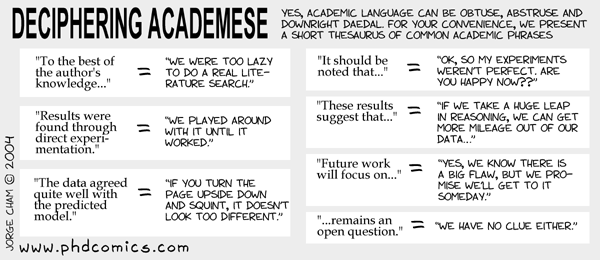
For me as a student in HSC I sum my ‘story’ here – It’s raining, cold and seems like summer won’t come to Bournemouth…but as a PGR student my definition is engagement is …”does it in the rain”! Bracing the sun and…Then the rain…while advertising Bournemouth University Festival of Learning Poole High Street. I spent two days talking about research in Nepal under the rain and it felt a bit like Waiting for the Monsoon in Poole! Using photos to make the passer-byes guess why a sickle is used during childbirth; and how health promotion improves health and wellbeing.
The day made for a good dry run for our events that will take place during the 3-14 June 2013 BU’s Festival of Learning; with a 100 events to choose from mastering social media, see if you are a super-recogniser. Also some of the ‘tough’ questions on culture and health in low-income countries helps with the reflective part of the thesis. Finally reducing that gap between the ivory tower of research and the public and in that reminded yourself why you do it…in the rain.
Come hear me at
“Waiting for the monsoon: Nepal stories & photos; Monday 3 June, 3pm-8pm,
Sheetal Sharma, Health and Social Care http://waitingforthemonsoon-eorg.eventbrite.co.uk/
Research Degrees @ BU Sheetal Sharma; Wednesday 5 June, 3pm-6pm” Location:
Talbot Campus
Never forget a face? Some people don’t, some people do after enough time has passed, while others can’t remember it in the first place. I have spent the past 8 months in the dark, lonely eye-tracking lab listening to various stories and exploring the ability that most of us take for granted – face recognition, using a small camera to record movements of peoples’ pupils.
For me, engagement is about raising awareness about how much we all differ in face recognition ability and why is it important that it should be taken into consideration in education and recruitment. Giving talks, presenting a poster, or engaging with public during forthcoming Festival of Learning all present excellent opportunities to disseminate my research, make me a better academic, and help people to understand face blindness and super-recognition. After all, unless on a lonely island, faces accompany us from the day we are born and throughout our whole life! So are you a super-recogniser?
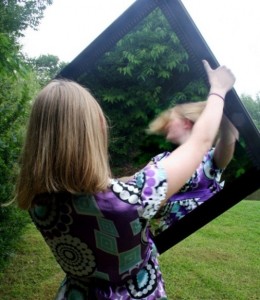
Anna Bobak, a 1st year Psychology Research Group, DEC Student and PGR rep.
It’s 6pm, and I‘m looking forward to getting home for a cup of tea. But before my day is done, I have a young lady with long brown hair sat in front of me, and, as we’re chatting about life, I am separating parts of her hair and sticking electrodes onto her head and face – which will be analysing her brain activity during her sleep. All in a day’s work, as my research has been exploring the way in which women sleep during their pregnancy, in comparison to non-pregnant women, and whether this relates to the development of postnatal depression. For me, engagement is about reminding myself of the value and purpose of my research.
Whether, it is arranging a coffee morning to thank all of the pregnant women that kindly volunteered to take part in my demanding study; getting out of my comfort zone and presenting my research at international conferences; or helping to train health visitors on important issues surrounding my research. It is about feeling that I am contributing to the bigger picture and making a small (but significant!) difference, as well as establishing myself as a researcher.
I do feel for my study participants as it can be a different night than they are used to!
Lauren Kita, a 3rd year Psychology Research Group, DEC PhD student.
Ivana Rihova, 3rd year School of Tourism
Volunteering to deliver a talk about my PhD on value co-creation at music and arts festivals during SUBU ‘Arrivals Week’ 2012, I tried to show to an audience of first years how fun PhD research at the School of Tourism can be. Last summer I visited five festivals where I observed and undertook a large number of interviews, to find out something about the social aspect of festival experiences. So, I thought, this is engagement – talking about my fieldwork and sharing some preliminary findings with a group of people who go to festivals every year, but perhaps never quite thought about them the way I do. But the slides of me in my wellies wading through the muddy festival site triggered memories of being hugged by a couple of elderly half-naked tattooed space-rock fans, listening to poetry, relaxing with a pint of really nice ale (after all the interviews were done, of course) and most importantly, talking to people.
One person in particular stuck in my mind. I sat down next to David in a quiet corner of a beautiful rose garden at a storytelling festival and we started to chat. I told him what I was doing and was really surprised when he insisted my researched seemed very worthwhile! His enthusiasm gave me a huge confidence boost but more importantly, got me thinking about the wider social and cultural implications of my research. So for me, engagement is… about learning rather than just telling and teaching. It is about dialogue, challenging my own ideas and letting others help to shape the research.
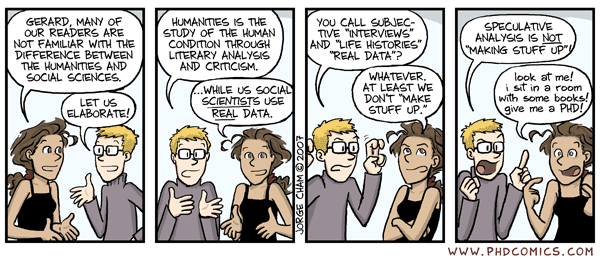




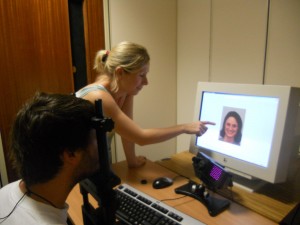 In September 2011 BU’s
In September 2011 BU’s 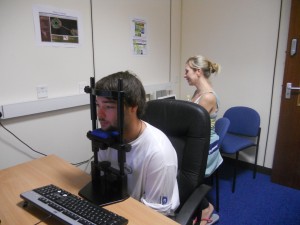 Prosopagnosia – or ‘face blindness’ – is a little known condition affecting 1 in 50 people. As Bournemouth University psychology lecturer Dr Sarah Bate explains, it is ‘literally a loss of memory for faces’.
Prosopagnosia – or ‘face blindness’ – is a little known condition affecting 1 in 50 people. As Bournemouth University psychology lecturer Dr Sarah Bate explains, it is ‘literally a loss of memory for faces’. As part of Mental Health Week here at BU Dr
As part of Mental Health Week here at BU Dr  and District branch, acting as their Patron and I organise their publicity. We are working on a number of local projects, not least looking to establish closer ties between BU and the Samaritans. A number of our students volunteer to work at the Branch. The Samaritans have a presence at several BU events. We are currently working with several people at BU to establish a crisis nightline, and training (any) staff who have contact with students who may need emergency help (we have already had some crises with the current BU student intake). We are also looking to work closely with other agencies and charities locally. Some of this may lead to research opportunities, exploring ways in which mental illness, stress and despair can be reduced in our community. I am planning a number of projects focusing on suicide and mental health (including the particular problems faced in rural communities).
and District branch, acting as their Patron and I organise their publicity. We are working on a number of local projects, not least looking to establish closer ties between BU and the Samaritans. A number of our students volunteer to work at the Branch. The Samaritans have a presence at several BU events. We are currently working with several people at BU to establish a crisis nightline, and training (any) staff who have contact with students who may need emergency help (we have already had some crises with the current BU student intake). We are also looking to work closely with other agencies and charities locally. Some of this may lead to research opportunities, exploring ways in which mental illness, stress and despair can be reduced in our community. I am planning a number of projects focusing on suicide and mental health (including the particular problems faced in rural communities). I am supervising a PhD project (Research student – Lauren Kita), working with the perinatal team within Dorset HealthCare University NHS Foundation Trust. We are exploring the extent that poor sleep may pose a risk factor for postnatal depression. We will be examining sleep objectively, using state-of-the-art EEG equipment, and subjectively, using sleep diaries. Women with a history of depression will compared to women without such a history, during pregnancy and at weeks 4 and 12 after the baby is born. The mother’s mood and other mental indicators will also be measured.
I am supervising a PhD project (Research student – Lauren Kita), working with the perinatal team within Dorset HealthCare University NHS Foundation Trust. We are exploring the extent that poor sleep may pose a risk factor for postnatal depression. We will be examining sleep objectively, using state-of-the-art EEG equipment, and subjectively, using sleep diaries. Women with a history of depression will compared to women without such a history, during pregnancy and at weeks 4 and 12 after the baby is born. The mother’s mood and other mental indicators will also be measured. Research by
Research by 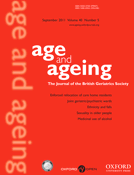 Prior to this project Samuel undertook a systematic review of older people’s participation in falls prevention interventions. Earlier this year Samuel presented this research at a symposium in Italy for the European Congress of the International Association of Gerontology and Geriatrics, which he also co-chaired. He will also present this work as one of the six selected oral presentations at the forthcoming
Prior to this project Samuel undertook a systematic review of older people’s participation in falls prevention interventions. Earlier this year Samuel presented this research at a symposium in Italy for the European Congress of the International Association of Gerontology and Geriatrics, which he also co-chaired. He will also present this work as one of the six selected oral presentations at the forthcoming 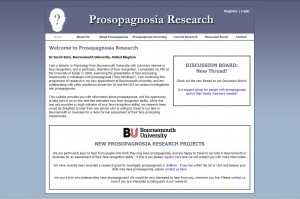











 UKCGE Recognised Research Supervision Programme: Deadline Approaching
UKCGE Recognised Research Supervision Programme: Deadline Approaching SPROUT: From Sustainable Research to Sustainable Research Lives
SPROUT: From Sustainable Research to Sustainable Research Lives BRIAN upgrade and new look
BRIAN upgrade and new look Seeing the fruits of your labour in Bangladesh
Seeing the fruits of your labour in Bangladesh Exploring Embodied Research: Body Map Storytelling Workshop & Research Seminar
Exploring Embodied Research: Body Map Storytelling Workshop & Research Seminar ECR Funding Open Call: Research Culture & Community Grant – Apply now
ECR Funding Open Call: Research Culture & Community Grant – Apply now ECR Funding Open Call: Research Culture & Community Grant – Application Deadline Friday 12 December
ECR Funding Open Call: Research Culture & Community Grant – Application Deadline Friday 12 December MSCA Postdoctoral Fellowships 2025 Call
MSCA Postdoctoral Fellowships 2025 Call ERC Advanced Grant 2025 Webinar
ERC Advanced Grant 2025 Webinar Update on UKRO services
Update on UKRO services European research project exploring use of ‘virtual twins’ to better manage metabolic associated fatty liver disease
European research project exploring use of ‘virtual twins’ to better manage metabolic associated fatty liver disease